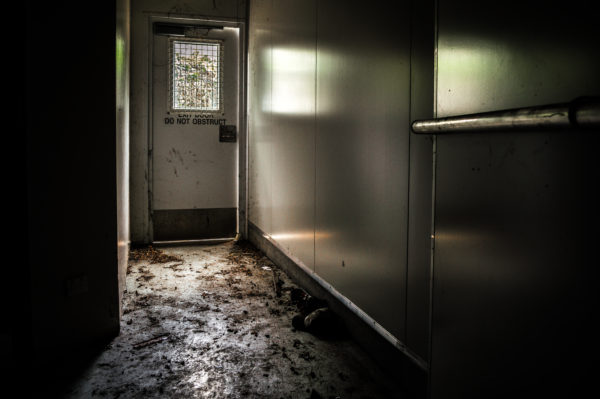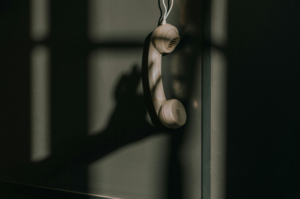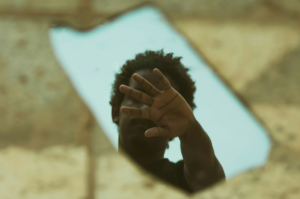
“So, you’re going out tonight?” you ask as you watch her pull one end of the twine tightened around her arm with her other hand while the other end is held by her clenched teeth.
“Nope,” she says, examining her hand for veins.
“For real?”
She looks at you briefly, her brows knotting. Then she picks up the syringe, bends closer to her arm to get a better view of a faintly popped vein. Squinting, she pushes the needle into the vein and empties the content of the syringe into her bloodstream while you watch. She raises her head, shutting her eyes for a moment, as if letting the heroine take effect, then exhales.
“Why are you so concerned about if I’m going out or not?”
“Well, I was wondering why you would be doping just to stay back in. It’s Friday night, yunno.”
She looks away and chuckles, and instantly you start to regret prying.
“You think like them.”
“Like who?”
“Like every other person in this damn place.”
“I don’t understand.”
She gets out of her bed and walks to the window to pull the blinds for some ventilation, then goes to the other corner of the room where the table is and retrieves a plastic chair she places beside yours and sits on. You become instantly uncomfortable, looking straight at the cheap painting hanging on the wall directly opposite you, clutching your backpack between your legs.
“You know,” she starts, “everyone here seems to think any girl doing drugs is a party-mongering-dick-loving-junkie.”
A pause.
But that’s what you are, you think. You really wish you hadn’t started this conversation, but since she’s on it now you could as well just kick at it.
“So?”
“Is that what you think too?”
You can feel her gaze pinned on you now, and you’re embarrassed about how intimidated you are by her growing imposingness.
“Well, I haven’t really met many girls on drugs to form a stereotype about them,” you say.
But you’re lying, of course. You’d vowed to never have any serious attachment with any girl doing drugs because they are always unstable and totally out of control. Any girl doing this shit, you’d said that day while you smoked weed with the guys, isn’t a girl anymore.
“I see,” she says in a tone that makes you sure she doesn’t believe you.
Silence.
She gets up from beside you, goes into the kitchen and returns with a large, flat plate with crusts of marijuana scattered on it and places it before you.
“I don’t have much left,” she says. Then she goes to the drawer to retrieve a pack of rolling-sheets from which she pulls a sheet and hands to you and takes one for herself. She sits on the tiled floor just below you and you both start to scoop the content of the plate into the sheets, rolling them into joints. You notice she’s rolling a finer stick than you are.
“So why did you start?” She asks out of the thickening silence.
“What?”
“You know, getting high.”
“Oh, well, dunno really,” you shrug,
“Just to get along maybe.”
“Hmmm. I see.”
“What about you?”
She lays her finely rolled stick of pot on the plate while you’re still trying to tie the loose end of yours. “Well, escape. . . yeah, escape.”
“I don’t get.”
She pulls herself up and walks to the drawer to get a lighter.
“You know. . . .” She lets the sentence hang as she lights her joint and takes a puff.
“When I was much younger,” she continues, “I created some sort of alternate universe in my head. You know, for survival. That was the only way I could stay sane while dealing with everything.”
You want to ask her what is everything? But you don’t. You just take the lighter from her and light your own blunt.
She takes another puff.
“Then I started taking stuff and, you know, it just seemed like the existence jumped right out of my head and exploded into my reality. I started to live my alternate reality in my normal existence. You get?”
“Yes, yes, I do.”
You don’t.
“I don’t know,” she shrugs, “it’s just a bit complicated, my life.” She sheds the ashes at the base of the blunt on the plate then takes another drag. “Living is really hard stuff.”
You know what’s happening. It’s the bonding that comes with blowing joints; everyone, motivated by the potency of the blunt, suddenly get philosophical. But it always happened with the guys. When you’re doing drugs with a girl, the endgame is usually, almost inevitably the same. Sex.
“Dying is harder, I think,” you say in a mere effort to be contributory to what has become a one-sided conversation.
She looks at you and smiles, then shakes her head mildly. “Not for me.” She goes to the door, opens it and flings the curtain behind it, for ventilation. You wonder if she doesn’t feel as uncomfortably exposed as you do. She sits back down. You’re not looking at her.
“People think I’m a total bitch.” She pulls a drag.
“They do?” You pretend not to know.
“Yup. They have good reasons to, though.”
“Really?”
“Yup. I mean, I have severe anger problems and I just don’t want to fuck with anyone else sometimes. I think I just hate everyone, and it’s so tedious every time I have to pretend I don’t.”
“That’s cold.”
“Yeah yeah.”
“You just naturally feel this way or something triggered it?”
“I don’t know.”
You both take puffs. The air in the room is thick with smoke. You’re straining for what to say next; you’re becoming as uncomfortable with the silence as you have been with the conversation.
“I think I’m toxic,” she says. “I used to be really sweet, but that’s so far back I barely know how it feels like.”
“At what point did you change? I mean, at what point did you feel like everything was becoming, you know, different?”
She gazes into space, as if trying to retrieve a distant memory. “I don’t remember much,” she shrugs. “After my first breakup maybe.”
“Tell me about it,” you say before you could restrain your curiosity.
“There’s not much to say. Not like it hurt that much in fact. It’s just, you know, the thing with love. One moment you’re just a young, sweet, innocent girl living life as it comes, totally oblivious to that feeling. Then it jumps at you and creates some space inside of you which it fills. You get?”
You don’t, yet you nod.
“So, love creates this space inside of you that wasn’t there before, then fills it out. You get totally carried away, intoxicated by the sweetness of this. . . feeling you can’t explain. Then it leaves abruptly. But it doesn’t leave with the space it has created inside of you. The space is left empty. Vacant. Then there comes the yearning. . . you know, to feel that thing you felt before.
“But then it’s too late. Once it leaves it leaves. You go through a lot of other people, dicks, in search of that magic you felt before. You don’t find it. At twenty-two you look back at how many beds you’ve had to grace, how many times you’ve had to hurt, just in the search for one feel of that beautiful thing you felt the first time. Sometimes you meet someone and feel like, Yes! This is it! But shortly after, you realise, Oh, false alarm. I’ve been played again.
“At some point you just get weary of trying. Humans become just shallow breathing objects to you. You start to loathe other people, yourself even more, and sex becomes just sport to you.”
You both have exhausted the joints, so she springs up immediately to clear the doping paraphernalia scattered around. You watch her go into the kitchen with the plate and you think, I’m definitely not getting laid tonight. Instantly you start to feel immense shame for thinking so.
For many other things:
For Jummy, the first girl, who you left at home with the promise of love but came to school and got consumed by the toxicities of life.
For Iye, who you realised—after all the sex—that you didn’t love, only pitied.
For the girl whose name you no longer recall, that you brought back from the club, drunk, and the next morning you woke up to her sobbing in bed beside you.
For all the things you had laughed about with your friends.
Maybe girls on drugs need love too, you think.
She returns from the kitchen and offers you chewing gum before going back to sit in bed, back against the wall, facing you as if expecting you to say something. You unzip your backpack and pull out a bottle of Magic Moment.
“I brought a gift,” you say.
She leaves her bed to the kitchen and returns with two tea mugs while you serve the liquor. She walks to the door and shuts it, then returns to her position in her bed and sips her drink. You sip yours, then feeling a pressing responsibility to bring the conversation back to life, you ask: “What about family? Anyone you give a damn about?”
“It’s complicated.”
“How so?”
“My mum. . . she kind of. . . doesn’t want anything to do with me anymore.”
“Wow. That’s a huge one.”
“Yeah, yeah. My dad left when I was six. Saw him a couple of times afterwards but we never really got along. Mum got married again to a man who already had kids of his own. Was supposed to, you know, be the father I almost never had. But then, no matter how much I tried it just didn’t work.
“We always fought, me and him. He’s a deadbeat even to his own kids. Sometimes he hit Mom. She wouldn’t leave. She wouldn’t. She would say, ‘How do I tell people I bunked two marriages?’”
She takes another sip.
“I do pity her a lot though”, she continues. “She’s almost fifty, with nothing but a series of unlucky marriages and a daughter who is a junkie.” She chuckles. “That’s why she’s projecting her failures on me. She did expect a lot from me. She did a lot of things wrong and hoped I became that one thing she did right.” She starts to laugh. “Then I got pregnant.” She slurps what’s left of her drink and reaches for a refill.
“Y—you have a child?”
“Yup. Her name is Neena.” She sips. “She’s five. She looks like me. I hate that she does. I try to love her but. . . I can’t. I have no love left in me to give out. My mum is raising her. She tries as much as she can to keep me away from her because she says I’m a bad influence. I think she’s right. I have no qualms, though. I think that in her, my mum sees another chance to raise a child properly again.”
You feel yourself floating in a whirlwind of emotions. You think of your own mother, who had left you with your father before you were old enough to hold a memory of her presence. You had grown to resent thoughts of her, and had refused to feel remorse for not accepting her back when she tried, for not accepting her even at her funeral three years ago. Now you’re sitting here, confronted with the knowledge of the hurt that makes a woman unable to love her own child.
You feel like you’re a character in her life story. You’re like Neena, conceived unplanned, thrown abruptly into the lives of two young people expected to love you even when they were struggling to find love themselves.
You look at her while she serves herself another round of liquor—you’re still on your first—and suddenly she’s no longer looking like the sex-starved-junkie whose room you had come to with hopes of having casual sex when you’re both done getting high. She’s just a girl who needs a lot of help, you think. You want to tell her about yourself too. You want to tell her about how you fared growing up with an indifferent father and a plethora of women who came and went. You wanted to tell her that just like her, you don’t feel love. But you don’t.
“You need help,” you manage to say.
“I’m fine.”
“You’re not.”
“I’ll be.”
You sigh. She’s tipsy by now, and her eyes seem to be having a hard time staying open. You look at the time: eight-thirty. You get up and say you have to go. She gets out of bed—with an effort—and offers to walk you out. You pick your backpack and let her take the lead while you tail behind in trepidation, wondering what the hell just happened.
“I read your story,” she says as she locks her door.
“Where?” you ask, alarmed.
“In the Departmental Literary Journal,” she says, walking past you towards the gate. “It’s moving.”
You remember the nonfiction piece you wrote for the journal, about your struggle to gain a proper perspective of life, and you realise that your being at her place that evening, having that conversation with her, was not coincidental. You’ve been singled out by her to reach out to, for help. You start to panic.
“We’ll get around sometime and talk some more?” she asks as you both get to her gate.
“Sure.” Even though you don’t want to.
Much later, you will think back to this night, to the conversation, to her glassy-eyed tale of her struggle with self. Much later, you will think back to all the times you avoided her after now because you were afraid of how much of yourself she reminds you of, and you will bury your head in your pillow and let it soak your tears. Much later, after you hear about her suicide.
Right now, though, she’s opening the gate for you.
________________________________________________________________________
Image from Flickr. Photo credit: lost information (We would appreciate being told).
________________________________________________________________________
About the Author:
 Victor Daniel is a Nigerian student of Law and a short story writer. His short stories have been published by The Kalahari Review and Storried. He lives in Lokoja, Kogi State.
Victor Daniel is a Nigerian student of Law and a short story writer. His short stories have been published by The Kalahari Review and Storried. He lives in Lokoja, Kogi State.









Chris April 20, 2021 16:47
I could tell she would commit sucide. Great piece VD